The Karthik Subbaraj Interview | 'I Don’t Make Movies With A View To Impress'
In an interview with Subha J Rao, director Karthik Subbaraj speaks about his worldbuilding, filmmaking process, getting back to the big screen after a gap, and more.
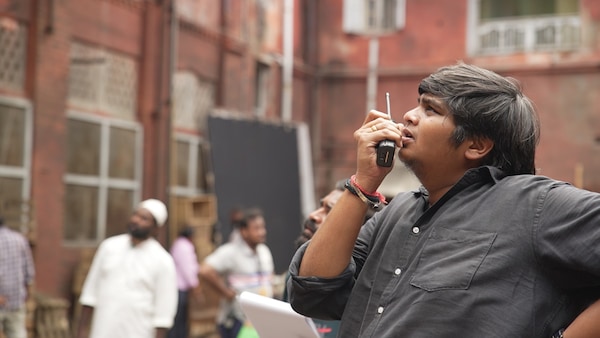
Last Updated: 01.31 AM, Feb 11, 2024
AFTER its release on Netflix, Karthik Subbaraj’s well-made Jigarthanda Double X has been receiving love from across geographies. The story of Kirubakaran/Ray Dasan (a gorgeous SJ Suryah), Caesar (Raghavendra Lawrence surprising all in a role that demanded so much of him), Rathnakumar (a ruthless Naveen Chandra), Jeyakodi (Shine Tom Chacko), Malaiarasi (a dignified, powerful Nimisha Sajayan) and Karmegam (Ilavarasu) is among the highest-rated action/adventure films on Letterboxd’s 2023 Year in Review.
Double X, which is an unabashed ode to Karthik’s love for cinema and Westerns, and a spiritual sequel to 2014’s Jigarthanda, speaks about the power of cinema and its ability to bring about change, against the backdrop of a gang war, tribal displacement and ivory smuggling.
Karthik’s film is dedicated to Clint Eastwood, Rajinikanth and Mani Ratnam. Clint Eastwood and a camera he gifted Caesar form an integral part of some scenes too — and these are deliciously rendered. (A fan had even tagged Clint’s official X handle to bring the film to his notice, and got a reply that said — “Clint is aware of the movie and would get to it upon the completion of his Juror 2”.)
Great performances apart, the film is possibly Karthik’s finest, for it is filled with immense love for the medium — the medium that has made Karthik among the torchbearers of the new generation of Tamil cinema. In an interview, the director speaks about his worldbuilding, filmmaking process, getting back to the big screen after a gap, and more.
How moved are you by the response to Jigarthanda Double X?
Very moved. I’ve been seeing the feedback in person in theatres and on social media and it’s very assuring. Recently, in the US, there was a great response from a predominantly white audience. I was surprised that our film spoke to them.
The big screen matters a lot to you, right?
Yes, probably because that’s where I began watching cinema. I find it larger than life. In Madurai, growing up, cinema was the only entertainment for all families. In a week, we would watch two movies — it could be Tamil, Telugu dubbed, or English films.
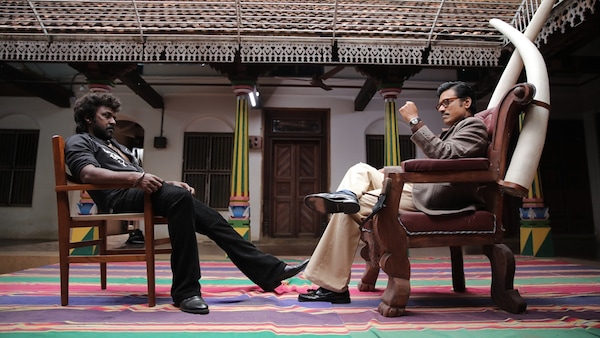
Most of our conversations used to revolve around cinema. And when it became a passion and I began making films, I realised what a strong medium it is. I consider cinema the highest art form, because it encompasses all art — music, photography, acting, dancing…
Films have always brought alive many incidents from the past. There’s a certain emotional empathy when you see films made about the horrors that people have lived through — like the Holocaust and World Wars. A newsreel will provide information, but only a movie will draw you into that world.
This being the case, the four years between Petta and this must have been hard on you...
It was. After the huge reception that Petta got, I’m seeing a film of mine on the big screen after such a long gap. We decided on an OTT release for Jagame Thanthiram and Mahaan. I missed a theatrical release. I always want to know what the audience thinks of my film. I like to see their reaction after the end credits roll. That was not possible.
I got it back with interest for Jigarthanda Double X. The collective vibe of a set of people who had dedicated their time to watch something — that was such a high. For the movies that came after Petta and before this, I never knew how people were watching the movie. I missed knowing that.
Writing-wise too, we see a very different Karthik in Jigarthanda Double X. There’s an emotional heft…
This was new territory for me too, for I’ve not written anything in this emotional zone. I’ve not written a screenplay like this or set the story in a space like this. I was in the mindset to write this, and I knew that I cannot treat it with hard humour. I knew this had to be written with a certain depth. I did explore some aspect of this seriousness in Iraivi, but not fully.
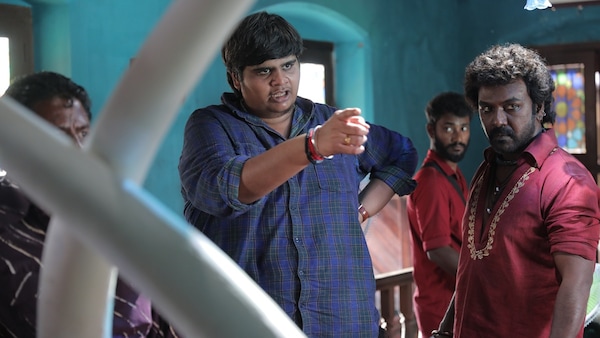
At one level, Jigarthanda Double X was about collective grief, it was about a group of people and the politics that affected them. It had to be dealt with, with the respect it deserved. I did not want to use it as a mere plot point.
This was a very new thing for me, and that meant a lot of research. We went to many places, met people from the tribal community, got to know about those who once walked on those lands, we met the people displaced. The result of those journeys was that I ended up writing my most political film.
Did you worry about how it would be received?
Not really. If you think too much, you won’t be able to create the cinematic moment you’re looking for. However, it is only towards the film’s climax that its politics is in-your-face.
Also strangely, of all my films, this one received very positive feedback from so many fans. This, when I expected a reasonable amount of contrary opinions.
Were you freer to make a Karthik film this time around because you were not working with big stars?
Honestly, I don’t feel any pressure when making any film. The only time I ‘knew’ I was working with a star was for Petta. I was clear I was writing and making a Superstar film.
This time, people seem to be finding a difference. I agree, but I think that they are seeing the experience I’ve picked up. I’ve learnt a lot in this decade making films, I’ve matured as a person. I’ve learnt to identify previous mistakes and correct them. I’ve been very particular about things such as post-production and edit patterns. I think that collective learning, plus the maturity of age and the patience that comes with it shows in Jigarthanda Double X.
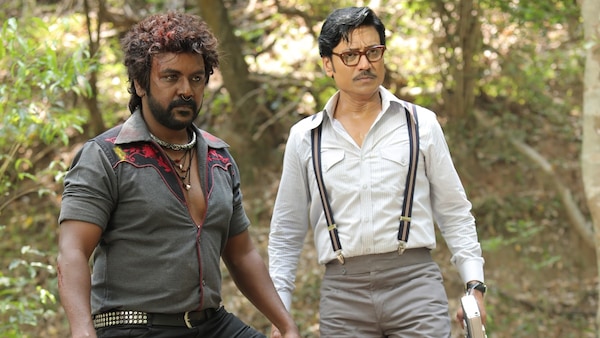
We are seeing tribal displacement and reading more about it now. But what was your trigger to make the movie?
When we decided to make the movie, I knew it had to bear the spirit of the original, and not be a continuation of that story.
I first thought of the story about seven years ago. I knew the base plot was about a gangster and a cop in the guise of a filmmaker. The social angle came in later, where I wanted them to work on something where they end up being people’s heroes. I needed time for the second half. I needed to write with a certain depth, and I decided to travel and meet people whose lived identities I was going to explore. I learnt about tribal culture, their connection with Nature, and the issues they face. Many of them have been forced to move out from the periphery of the forest they adore, and head to the cities as daily (wage) labourers.
Were you worried about the length of the film at a time when audience attention span is low?
I was not. I only had to worry about that for Jagame Thanthiram, because it was going to be streamed to 180 countries through Netflix, and they wanted me to trim it, because not all audiences are used to this length. But, as a result, some people said I jumped straight into the story without establishing the characters.
With Mahaan, many seemed fine with the length. If I had rushed through that film, it might not have registered the way it did.
(We’ve been speaking as Karthik waits for a flight, and someone interrupts to tell him that ‘Jigarthanda Double X is very nice’. He indulges in some chatter before resuming our conversation.)
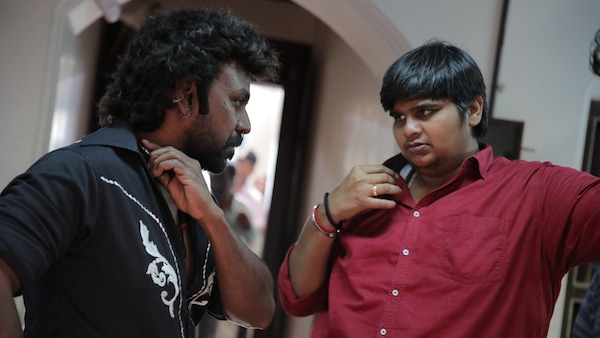
This acceptance and open adoration. Does that matter a lot? Or, is love for cinema enough to nurture you?
This feels great, yes. But, I am someone who lives for the theatrical experience. And nowhere else do you feel adoration and acceptance better than in a theatre. It feels really good. That said, I don’t make movies with a view to impress. That making is purely driven by love for cinema. I need the first, the adoration is a bonus.
Your casting was looked at with curiosity, but after the release, with a certain awe. How did you know this would work?
Lawrence Sir was supposed to be a part of Jigarthanda 1 as Assault Sethu. After it was released with Bobby Simha playing the role, he said he really liked the film and wanted to work with me. I thought of this storyline during the Iraivi shoot, and he was willing to come on board.
After Mahaan, I knew where the story was going, and thought of the tribal connect. I knew the strengths of my actors SJ Suryah and Raghavendra Lawrence. I knew they’d do the transformations well.
As for Naveen Chandra (who has received much love in 2023 for Jigarthanda and Month of Madhu), I liked him a lot in the Telugu film Ammu that we produced. I wanted someone fresh to Tamil (cinema) to play the antagonist. And he did an excellent job.
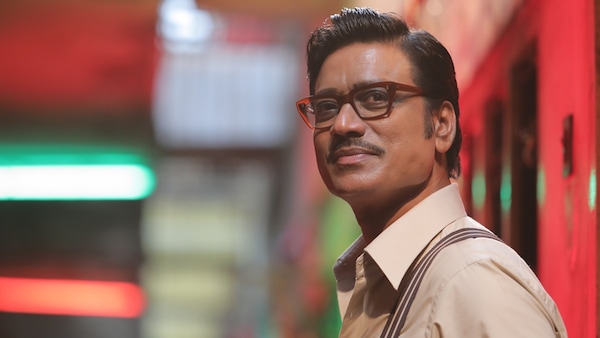
Composer Santhosh Narayanan and you make for a good team. How did you decide on the soundscape?
Santhosh loved the idea of the film, and he was especially drawn to the forest portions. He has a personal connect with forests, and has a few elephant stories from his childhood. He was eager to do his research and work on the film.
The rest of the team was equally excited about what we had embarked on. We needed quality VFX work for the elephant portions. We depended on cinematographer Thiru Sir and Sreenivas Mohan, who has won multiple national awards for his VFX work.
Our art director T Santanam tragically passed away before shoot began, but he had given us his designs for Madurai of the ‘70s, and Bala Subramanian and Kumar Gangappan brought them alive.
The film is as much about the power of cinema as it is about the ability to forgive, right?
Yes, I agree. It’s about an opinion, the changes brought about by that, a change in perception, and a new journey.
Nature is a healing agent, and forgives too. The elephant forgives, gives absolution to someone who has always been afraid of it.
Jigarthanda means so many things to people now. What does it mean to you?
It is Madurai, my hometown. This film could not have possibly had any other title!
Subscribe to our newsletter for top content, delivered fast.
